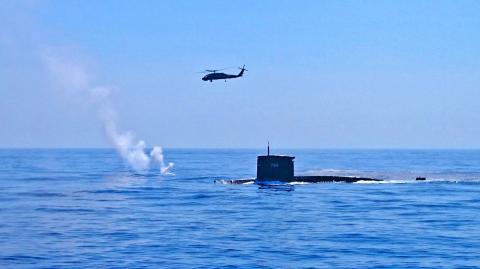China continues to target Taiwan for attack and invasion in the event of conflict, and Beijing is likely to declare a South China Sea air defense identification zone (ADIZ) in the near future to bolster its claim on the islets and reefs in the region, the Ministry of National Defense (MND) said.
According to MND reports released yesterday, Beijing convened high-level meetings to re-evaluate its cross-strait policies following last year’s Sunflower movement and related protests by Taiwanese against the government’s move to force a cross-strait service trade agreement with China through the legislature.
The report said China is concerned about the outcome of Taiwan’s presidential and legislative elections in January next year, and its People’s Liberation Army (PLA) has therefore conducted a series of military drills in recent months simulating an invasion of Taiwan, known as “Operation Decapitation,” in which airborne paratroopers and special forces practiced descending on the Presidential Office Building in Taipei City in a rapid assault.

Photo: Lo Tian-pin, Taipei Times
Outlining China’s plans for attack against Taiwan, the report said Beijing would first use a combination of military threats and actions to intimidate Taiwanese, then blockade major ports of the nation’s frontier islands, such as Kinmen, Matsu and other outlying maritime territories.
After that, PLA missiles and other firepower would be deployed to attack Taiwan’s major military and political headquarters, along with telecommunications infrastructure, which would be followed by mounting airborne and amphibious landings for an invasion.
The report said the possible scenarios for a Beijing attack could arise from situations such as Taiwan’s declaration of independence or heading unequivocally toward independence, acquisition of nuclear weapons, internal political turmoil, delaying of dialogue on cross-strait negotiations toward unification, foreign forces interfering in Taiwan’s internal affairs, or deployment of foreign troops in the country.

Photo: Lo Tian-pin, Taipei Times
The ministry said Taiwan’s armed forces are capable of defending the nation, and would undertake drills to simulate a defense of the Presidential Office Building and the greater Taipei area, in what is dubbed “Counter-Operation Decapitation,” during the yearly Han Kuang military exercises, which are scheduled to take place next week.
In the past few days, marine amphibious units together with other special forces troops have been seen conducting drills along coastal regions and shores of the Tamsui River (淡水河) in northern Taiwan, while the military police brigade tasked with maintaining the security of the Presidential Office Building have also been training to defend against a potential attack.
The report concluded that China’s island-building spree in the South China Sea has completely changed the strategic structure in the region, adding that China has stepped up militarization and to claim sovereignty while exploring deposits of oil, hydrocarbons and other natural resources.
China has begun reclamation work on seven reefs and is undertaking construction of a seaport, airport runways and other infrastructure facilities, the report said.
Additional reporting by CNA

SECURITY: As China is ‘reshaping’ Hong Kong’s population, Taiwan must raise the eligibility threshold for applications from Hong Kongers, Chiu Chui-cheng said When Hong Kong and Macau citizens apply for residency in Taiwan, it would be under a new category that includes a “national security observation period,” Mainland Affairs Council (MAC) Minister Chiu Chui-cheng (邱垂正) said yesterday. President William Lai (賴清德) on March 13 announced 17 strategies to counter China’s aggression toward Taiwan, including incorporating national security considerations into the review process for residency applications from Hong Kong and Macau citizens. The situation in Hong Kong is constantly changing, Chiu said to media yesterday on the sidelines of the Taipei Technology Run hosted by the Taipei Neihu Technology Park Development Association. With

A US Marine Corps regiment equipped with Naval Strike Missiles (NSM) is set to participate in the upcoming Balikatan 25 exercise in the Luzon Strait, marking the system’s first-ever deployment in the Philippines. US and Philippine officials have separately confirmed that the Navy Marine Expeditionary Ship Interdiction System (NMESIS) — the mobile launch platform for the Naval Strike Missile — would take part in the joint exercise. The missiles are being deployed to “a strategic first island chain chokepoint” in the waters between Taiwan proper and the Philippines, US-based Naval News reported. “The Luzon Strait and Bashi Channel represent a critical access

‘FORM OF PROTEST’: The German Institute Taipei said it was ‘shocked’ to see Nazi symbolism used in connection with political aims as it condemned the incident Sung Chien-liang (宋建樑), who led efforts to recall Democratic Progressive Party (DPP) Legislator Lee Kun-cheng (李坤城), was released on bail of NT$80,000 yesterday amid an outcry over a Nazi armband he wore to questioning the night before. Sung arrived at the New Taipei City District Prosecutors’ Office for questioning in a recall petition forgery case on Tuesday night wearing a red armband bearing a swastika, carrying a copy of Adolf Hitler’s Mein Kampf and giving a Nazi salute. Sung left the building at 1:15am without the armband and apparently covering the book with a coat. This is a serious international scandal and Chinese

COUNTERINTELLIGENCE TRAINING: The ministry said 87.5 percent of the apprehended Chinese agents were reported by service members they tried to lure into becoming spies Taiwanese organized crime, illegal money lenders, temples and civic groups are complicit in Beijing’s infiltration of the armed forces, the Ministry of National Defense (MND) said in a report yesterday. Retired service members who had been turned to Beijing’s cause mainly relied on those channels to infiltrate the Taiwanese military, according to the report to be submitted to lawmakers ahead of tomorrow’s hearing on Chinese espionage in the military. Chinese intelligence typically used blackmail, Internet-based communications, bribery or debts to loan sharks to leverage active service personnel to do its bidding, it said. China’s main goals are to collect intelligence, and develop a